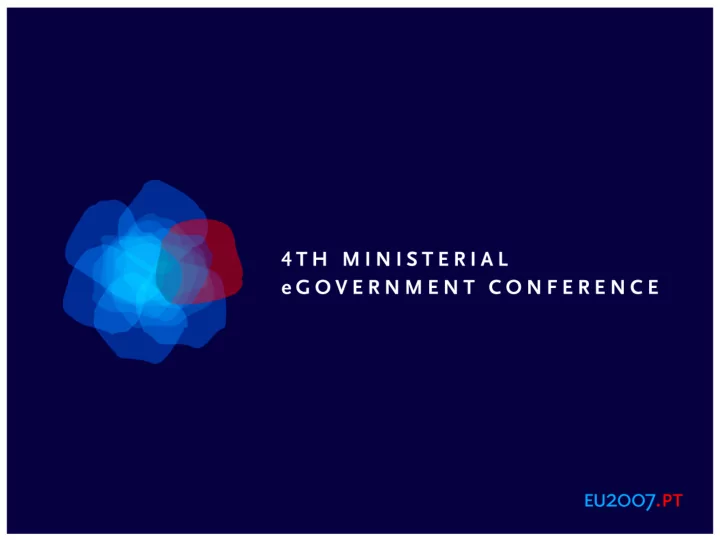

The Future of the World Wide Web (followup to Sir Tim Berners-Lee)
José Manuel Alonso eGovernment Lead (W3C/CTIC)
The Future of the World Wide Web Internet-connected computers and the World Wide Web are revolutionizing the ways in which citizens and governments interact. The Web has become the main channel for Governments to deliver electronic Services to citizens; Web technologies are also playing a crucial role in the relationships between Governments and between Governments and Industry, but are Governments taking as much advantage as possible of the Web? This talk reviews a number of topics about the future of the World Wide Web that could help Governments to make better use of their resources and improve the whole eGovernment experience.
Why W3C cares about eGovernment? The Web has become the main channel for • Governments to deliver services to citizens Web technologies play a crucial role in the • relationships between Governments, and between Governments and Industry Use of W3C Technologies in eGovernment is • constantly increasing • W3C standards have started to be named in laws all over the world (e.g. Web Accessibility) Governments give increasing importance to • consensus building and open standards
Current eGovernment efforts at W3C Series of discussions to better understand the needs • of Government in deploying current Web standards and the directions that future Web standards should take to best address delivery of Government services. Two workshops so far: • • European Symposium on eGovernment, Gijón, Spain, 1-2 February 2007 • Toward More Transparent Government: Workshop on eGovernment and the Web, Washington DC, USA, 18-19 June 2007
Keeping it simple eGovernment • • “the use of ICTs, and particularly the Internet, as a tool to achieve better government” The Web is the main channel to deliver eGovernment • services Forget the paper-based procedures • • change is not an option, just do it!
Openness
Why Open Web Standards? Open Standards increase innovation and competition • Increase citizens and market trust • • not tied to proprietary solutions • avoid vendor lock-in Governments should help define Open IST Standards • Governments should store and share information • using open standards
What Open Standard means? Transparent process • Open participation • Technical Consensus • Running code • Free and Persistent Specification • W3C Patent Policy for Web Technologies •
Best Practices and Methodologies The development of standards-based interoperable • frameworks is important to improving efficiencies and increasing the value of IT investments Foundational technologies based on Web standards, • together with best practices for deployment, is the focus of the World Wide Web Consortium's work Accessibility as an example: • • adherence to standards makes it easier for the content providers to serve browser-independent content • Government leadership is important in getting the technology vendors and the content providers to do the right thing for all citizens
Data Integration, Interoperability
Basic Interoperability What about Web pages that can only be accessed • using a given browser? New technologies, old problems, e.g.: • • mobile phones as enablers of Government services (e.g. in developing countries) • difficult to build an interoperable solution (too many devices, browsers...), see the Mobile Web Initiative (MWI) work
Semantic Interoperability Lots of initiatives and interoperability frameworks built • or in the works • usually work only in a given context (national, regional...), hard to interoperate between them yet Producing XML does not mean being interoperable • Interoperability is not a technical (only) issue •
Data Integration Use Semantic Web technologies • • allows mixing data from very different sources • no need to thrown away your existing data or systems, just build on top • share, publish, use standards (RDF, OWL, SPARQL...), plan for unexpected reuse • use IDs (URIs) Governments should be an authoritative source of • Semantic Web-enabled information
Privacy, Transparency, Trust
Creating a Trust Context Opacity is not the solution, transparency is the way to • go • use the data for the purpose it was collected Privacy and Security are requirements to build trust • with citizens to use eGovernment services W3C's work in Web Security can help governments • to standardize and provide solutions that citizens can understand clearly and trust • and is already doing so
Conclusions
Conclusions eGovernment Services increasing sophistication, but • “good old problems” not solved yet, e.g., interoperability, data sharing and integration... The use of Open Standards can help • Need cooperation and skip reinventing the wheel, • e.g., use cases and best practices W3C has a role to play, but we cannot do it alone • Governments should be involved in development of • open standards eGovernment should be accessible to all • Remember: “change is not an option, just do it!” •
Thanks
World Wide Web Consortium Background
W3C Background The World Wide Web Consortium (W3C) is an International Consortium • where Member and External organizations, a full-time technical staff, and the public work together to lead the World Wide Web to its full potential by developing Web standards such as protocols and guidelines that ensure long-term growth for the Web. Goals: Interoperability, Universality, Functionalities • Neutral/not-for-profit, consensus based, open participation, open results • ~450 members, ~70 staff, • ~50 Working Groups, ~20 Coordination Groups and Interest Groups • Hosting: MIT (America), ERCIM (Europe) and Keio University (Japan) + 17 • Offices Advisory Board, Technical Architecture Group • Liaisons with 40+ other standards bodies, Accountable to the global Public • Find more about W3C at http://www.w3.org/Consortium/ •
These slides are available at http://www.w3.org/2007/Talks/0921-Lisbon-JA/
Recommend
More recommend